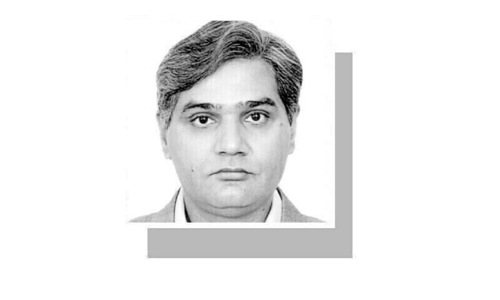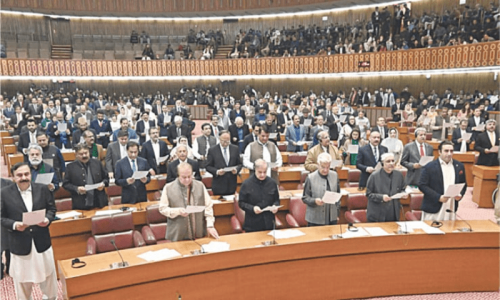• ECP turns down SIC plea as party didn’t submit list for reserved seats on time
• Commission to distribute vacant seats proportionally among other parties; one member dissents
• Nomination papers of Zardari, Achakzai accepted
• PTI rejects decision as ‘unconstitutional, against democracy’; wants Senate, presidential polls postponed
ISLAMABAD: After the Election Commission of Pakistan decided against the allocation of reserved seats to the PTI-backed Sunni Ittehad Council (SIC) for “having non-curable legal defects and violation of mandatory provision of submission of the party list for reserved seats”, the PTI decided to approach the Supreme Court against the 4-1 decision of the election watchdog.
The announcement of the decision coincided with the acceptance of nomination papers of ruling coalition-backed PPP candidate Asif Ali Zardari and PTI-backed PkMAP leader Mahmood Khan Achakzai for the upcoming presidential elections, set to take place on March 9.The final list of all eligible candidates will be released on March 5, though nominees can withdraw from the race until March 6.
In a 22-page judgement reserved last week, the ECP on Monday said that in light of clear provisions of Article 51(6), read with Section 104 of the Elections Act, 2017, the SIC was not entitled to claim for the quota for reserved seats.
The commission also decided to distribute the seats among other parliamentary parties, with the PML-N and the PPP appearing to be major beneficiaries if the decision was not reversed by the apex court. “The seats in the National Assembly shall not remain vacant and will be allocated by proportional representation process of political parties on the basis of seats won by political parties. [The] office is directed to calculate the quota accordingly.”
Though there is no clarity on the seat-sharing formula, the distribution would prove particularly tricky in Khyber Pakhtunkhwa (KP) where the PTI-backed independents had clinched 91 out of the total 115 general seats while none of the other political parties could reach the double-digit.
ECP member dissents
The ECP member from Punjab, Babar Hassan Bharwana, however, differed with the idea of distributing the seats among different political parties.
In his dissenting note, Mr Bharwana said he agreed to the extent that the reserved seats could not be allocated to the SIC since the party failed to submit its priority in time — a basic requirement of the law — and noted it cannot be submitted at a later stage after the conduct of elections. He opined that the seats should remain vacant till the amendment to Article 51(6-d) and Article 106(3-c). These articles state the reserved seats will be allocated to the political parties on the basis of their total number of general seats in the national and provincial assemblies.
The ECP order said though the SIC was a registered political party with the commission having its electoral symbol, it did not participate in the general election as a registered political party. It may be noted SIC leader Hamid Raza contested polls as an independent candidate. The ECP order said the SIC did not submit the list to the commission which meant that it was not interested in contesting polls as a political party nor did it want the reserved seats.
It also referred to the argument advanced by the SIC counsel who cited the example of the Balochistan Awami Party (BAP) regarding the allocation of reserved seats in the KP Assembly in 2019, saying the counsel failed to provide any document in support of his arguments.
According to the ECP, it is clearly stated in Article 51(6) of the Constitution that the seats will be allocated to the political parties which contested the election and won general seats in the assembly and the seats reserved for women and non-Muslims will be allocated on the basis of a proportional representation system.
The order also referred to the Supreme Court judgement which stressed that the “negative language used in a statute where it reposes a statutory duty on a public official means that the provision was mandatory even if no penalty is prescribed for it”.
It added that Section 104 of the Elections Act, 2017 stipulates that for the purpose of allocation of reserved seats, a political party shall within the period fixed by the commission file a separate list for reserved seats.
PTI reaction
The PTI demanded the resignation of the ECP chief and its members and rejected the decision as unconstitutional and a stab in the heart of democracy.
It also demanded the postponement of the upcoming election of the president and the Senate till the outcome of the plea they planned to file in the apex court. Speaking in the upper house of parliament, PTI leader Senator Syed Ali Zafar said there was no room in the Constitution for the elections with an incomplete electoral college.
Minutes after the ECP’s decision, Senator Zafar said the PTI would not accept the result of the presidential and Senate elections if these were held before the decision of the apex court.
He said all elections in an incomplete house were illegal.
“We understand that the election of prime minister was also unconstitutional,” he said.
“This is the last assault on the heart of democracy,” Senator Zafar said while rejecting the decision of the ECP.
The PTI leader said that under Article 51(6)(d) of the Constitution, the ECP has to allocate reserved seats to any political party on the basis of its proportional strength of general seats in the national and provincial assemblies.
Published in Dawn, March 5th, 2024
















































